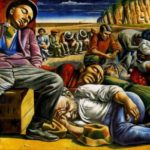
Surplus Alongside Excess: Uno Kōzō, Imperialism, and the Theory of Crisis
Uno Kōzō’s Theory of Crisis provides us with not only a way to think about Marx’s Capital as a theoretical structure, but also the conditions of possibility for a renewal of politics in the face of our current situation. Paradoxically, the theoretical eternality of the laws and norms constituting capitalist society is precisely what allows us to grasp the historicity and finitude of the capitalist mode of production itself. And while the necessity of crisis does not simply lead to the necessity of collapse of the system, it does allow us to think otherwise about the necessity of capitalism itself.
 Viewpoint Magazine
Viewpoint Magazine







